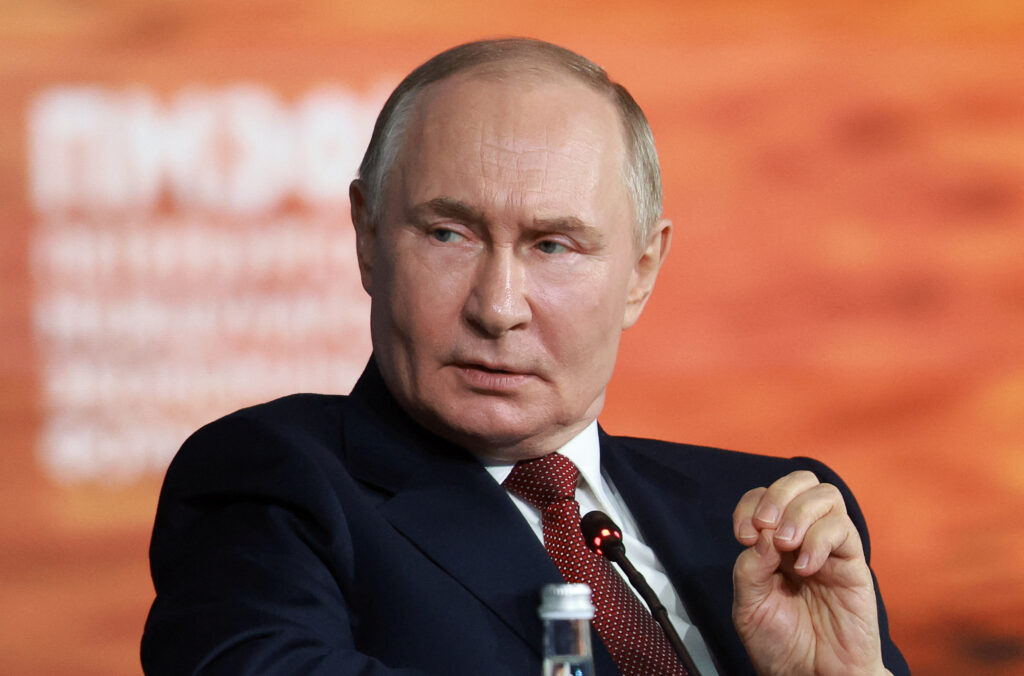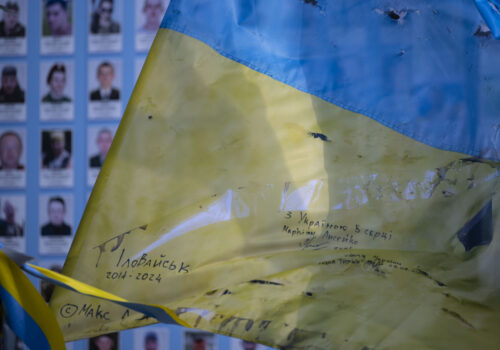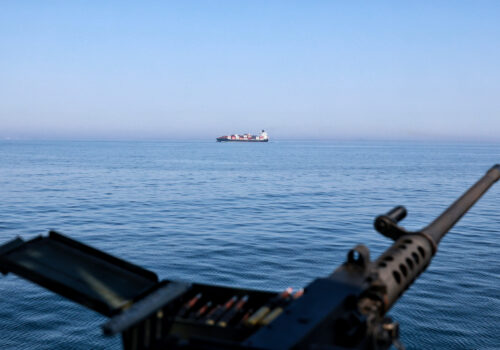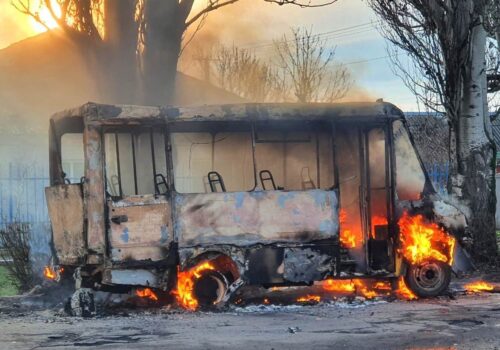Russian President Vladimir Putin believes “all of Ukraine is ours,” he declared last week. The Kremlin leader’s revealing statement is an indication of the increasingly confident mood in Moscow as Russia continues to make slow but steady progress on the Ukrainian battlefield against a backdrop of deepening Western disunity. It also serves as a timely reminder of the unapologetic Russian imperialism that is driving Europe’s largest invasion since World War II.
Putin’s comments came on June 20 during his headliner appearance at the St. Petersburg International Economic Forum, a flagship annual event that is often referred to as Russia’s Davos. “I have said many times that I consider the Russian and Ukrainian peoples to be one people. In this sense, all of Ukraine is ours,” Putin told forum guests. “We have an old rule. Wherever a Russian soldier sets foot is ours.”
Tellingly, Putin’s claim that “all of Ukraine” belongs to Russia was met with what appeared to be spontaneous laughter and applause from many of those attending the St. Petersburg event. This strikingly enthusiastic audience reaction says much about the normalization of imperialistic sentiment in today’s Russia after more than eleven years of the country’s colonial war against neighboring Ukraine.
Stay updated
As the world watches the Russian invasion of Ukraine unfold, UkraineAlert delivers the best Atlantic Council expert insight and analysis on Ukraine twice a week directly to your inbox.
Kyiv was quick to condemn the Russian leader’s statements. Ukrainian President Volodymyr Zelenskyy said Putin’s “performance” was confirmation of his expansionist imperial ambitions, and warned that the threat posed by resurgent Russian imperialism extended to “Belarus, the Baltic states, Moldova, the Caucasus, countries like Kazakhstan, and every place on Earth that Russian killers can reach.”
Ukrainian Foreign Minister Andrii Sybiha accused Putin of demonstrating “complete disdain” for ongoing peace efforts initiated by US President Donald Trump. “While the United States and the rest of the world have called for an immediate end to the killing, Russia’s top war criminal discusses plans to seize more Ukrainian territory and kill more Ukrainians,” commented Sybiha.
Others were considerably less diplomatic, with many Ukrainians taking to social media to vent their anger over this very public embrace of Russian imperialism. “Putin says Russians and Ukrainians are one people while Russians are bombing, raping, and killing us,” commented Ukrainian security analyst Maria Avdeeva. “We’re not your brothers. We’re your survivors.”
Eurasia Center events

None of this is entirely new, of course. The contempt for Ukrainian statehood and national identity that was on display at the St. Petersburg forum is deeply rooted in Russian imperial tradition and has become an increasingly prominent feature of Putin’s reign over the past twenty five years. As Putin himself acknowledged last week, he has consistently claimed that Ukrainians are in fact Russians (“one people”). As long ago as 2008, he was already telling US President George W. Bush that in his opinion Ukraine was “not even a country.”
Ever since Russia’s war against Ukraine began in 2014 with the seizure of Crimea, Putin has been weaponizing history to undermine Ukraine’s legitimacy and justify his own escalating campaign of imperial aggression. On the eve of the February 2022 full-scale invasion, he took the unusual step of publishing an entire 5000-word history essay that read like a declaration of war against Ukrainian statehood. Once the attack was underway, he likened his invasion of Ukraine to the imperial conquests of eighteenth century Russian Czar Peter the Great, while arguing that he was “returning historically Russian lands.”
Many of Putin’s historical distortions border on the absurd. He makes no mention of the entire centuries-long struggle for Ukrainian statehood, while conveniently ignoring countless examples of Russian imperial policies designed to silence Ukrainians and erase Ukrainian identity. Instead, he argues that Ukraine is an artificial entity created by Vladimir Lenin and the Bolsheviks in the early twentieth century. Putin is clearly not a fan of Voltaire, who observed almost three hundred years ago in 1731 that “Ukraine has always aspired to be free.”
Putin’s obsessive Ukraine denial has set the tone for the whole Russian establishment and given rise to similarly eliminationist language from numerous other Kremlin officials. In early 2024, former Russian president Dmitry Medvedev stated that “the existence of Ukraine is mortally dangerous for Ukrainians.” More recently, close Putin aide Nikolai Patrushev announced that Ukraine may soon “cease to exist.” Vicious anti-Ukrainian rhetoric has become so commonplace in the Kremlin-controlled Russian media that UN officials believe it may constitute “incitement to genocide.”
The actions of the Russian army in Ukraine closely mirror this genocidal rhetoric. In areas of Ukraine seized by the Kremlin, thousands of people have been arrested based on their pro-Ukrainian stance and have since disappeared into a vast network of prisons. A UN probe has determined that these mass detentions are a crime against humanity. Remaining residents in occupied regions of Ukraine are forced to accept Russian citizenship and subjected to relentless russification in every sphere of public life, with all traces of Ukrainian statehood and national identity systematically removed or suppressed.
Meanwhile, Trump’s efforts to broker a peace deal have proved fruitless in large part due to Putin’s uncompromising position. While Ukraine has backed a US proposal for an unconditional ceasefire, Russia has refused to do likewise. Instead, Moscow has sought to derail ceasefire talks while making maximalist demands that would leave Ukraine internationally isolated, partitioned, disarmed, and forced to reject an independent identity in favor of an imperial Russian ideology. Such terms would be fatal for Ukrainian statehood.
The widespread Russian belief that Ukraine has no right to exist helps to explain the brutality of the current invasion and makes a complete mockery of US-led efforts to broker a compromise peace. Putin’s latest comments now provide further proof that he has no real interest in a negotiated settlement and is determined to destroy Ukraine as a state and as a nation. This extreme brand of Russian imperialism is the root cause of the invasion.
Until Russia is forced to abandon its imperial ambitions and accept the inevitability of an independent Ukraine, the war will continue. This long overdue shift in Russian perceptions can be achieved by dramatically increasing Western military aid to Ukraine, strengthening support for Ukraine’s domestic defense industry, and making the kind of long-term commitments that remove any doubt over the West’s collective resolve to safeguard Ukrainian security. A lasting peace is possible, but it will only come once Russia recognizes that Ukraine is too strong to be subjugated.
Peter Dickinson is editor of the Atlantic Council’s UkraineAlert service.
Further reading
The views expressed in UkraineAlert are solely those of the authors and do not necessarily reflect the views of the Atlantic Council, its staff, or its supporters.

The Eurasia Center’s mission is to enhance transatlantic cooperation in promoting stability, democratic values, and prosperity in Eurasia, from Eastern Europe and Turkey in the West to the Caucasus, Russia, and Central Asia in the East.
Follow us on social media
and support our work
Image: Russia's President Vladimir Putin speaks during a plenary session of the St. Petersburg International Economic Forum (SPIEF) in Saint Petersburg, Russia. June 20, 2025. (REUTERS/Anton Vaganov)




